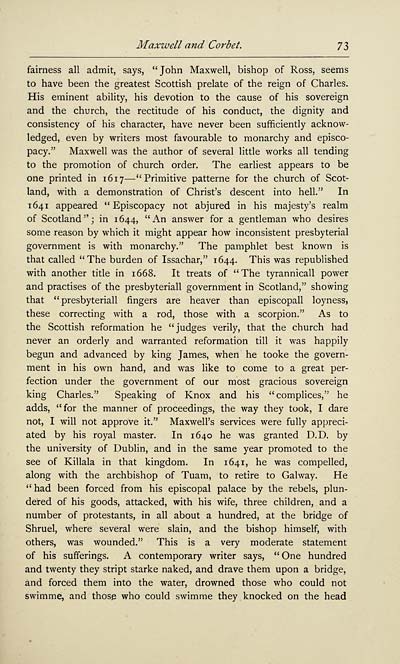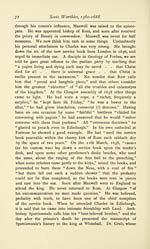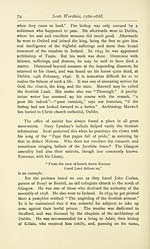Scots worthies, 1560-1688
(93) Page 73
Download files
Complete book:
Individual page:
Thumbnail gallery: Grid view | List view

Maxwell and Corbet. 73
fairness all admit, says, "John Maxwell, bishop of Ross, seems
to have been the greatest Scottish prelate of the reign of Charles.
His eminent ability, his devotion to the cause of his sovereign
and the church, the rectitude of his conduct, the dignity and
consistency of his character, have never been sufficiently acknow-
ledged, even by writers most favourable to monarchy and episco-
pacy." Maxwell was the author of several little works all tending
to the promotion of church order. The earliest appears to be
one printed in 16 17 — "Primitive patterne for the church of Scot-
land, with a demonstration of Christ's descent into hell." In
1 64 1 appeared " Episcopacy not abjured in his majesty's realm
of Scotland"; in 1644, "An answer for a gentleman who desires
some reason by which it might appear how inconsistent presbyterial
government is with monarchy." The pamphlet best known is
that called "The burden of Issachar," 1644. This was republished
with another title in 1668. It treats of "The tyrannicall power
and practises of the presbyteriall government in Scotland," showing
that "presbyteriall fingers are heaver than episcopall loyness,
these correcting with a rod, those with a scorpion." As to
the Scottish reformation he "judges verily, that the church had
never an orderly and warranted reformation till it was happily
begun and advanced by king James, when he tooke the govern-
ment in his own hand, and was like to come to a great per-
fection under the government of our most gracious sovereign
king Charles." Speaking of Knox and his "complices," he
adds, "for the manner of proceedings, the way they took, I dare
not, I will not approve it." Maxwell's services were fully appreci-
ated by his royal master. In 1640 he was granted D.D. by
the university of Dublin, and in the same year promoted to the
see of Killala in that kingdom. In 1641, he was compelled,
along with the archbishop of Tuam, to retire to Galway. He
" had been forced from his episcopal palace by the rebels, plun-
dered of his goods, attacked, with his wife, three children, and a
number of protestants, in all about a hundred, at the bridge of
Shruel, where several were slain, and the bishop himself, with
others, was wounded." This is a very moderate statement
of his sufferings. A contemporary writer says, " One hundred
and twenty they stript starke naked, and drave them upon a bridge,
and forced them into the water, drowned those who could not
swimme, and those who could swimme they knocked on the head
fairness all admit, says, "John Maxwell, bishop of Ross, seems
to have been the greatest Scottish prelate of the reign of Charles.
His eminent ability, his devotion to the cause of his sovereign
and the church, the rectitude of his conduct, the dignity and
consistency of his character, have never been sufficiently acknow-
ledged, even by writers most favourable to monarchy and episco-
pacy." Maxwell was the author of several little works all tending
to the promotion of church order. The earliest appears to be
one printed in 16 17 — "Primitive patterne for the church of Scot-
land, with a demonstration of Christ's descent into hell." In
1 64 1 appeared " Episcopacy not abjured in his majesty's realm
of Scotland"; in 1644, "An answer for a gentleman who desires
some reason by which it might appear how inconsistent presbyterial
government is with monarchy." The pamphlet best known is
that called "The burden of Issachar," 1644. This was republished
with another title in 1668. It treats of "The tyrannicall power
and practises of the presbyteriall government in Scotland," showing
that "presbyteriall fingers are heaver than episcopall loyness,
these correcting with a rod, those with a scorpion." As to
the Scottish reformation he "judges verily, that the church had
never an orderly and warranted reformation till it was happily
begun and advanced by king James, when he tooke the govern-
ment in his own hand, and was like to come to a great per-
fection under the government of our most gracious sovereign
king Charles." Speaking of Knox and his "complices," he
adds, "for the manner of proceedings, the way they took, I dare
not, I will not approve it." Maxwell's services were fully appreci-
ated by his royal master. In 1640 he was granted D.D. by
the university of Dublin, and in the same year promoted to the
see of Killala in that kingdom. In 1641, he was compelled,
along with the archbishop of Tuam, to retire to Galway. He
" had been forced from his episcopal palace by the rebels, plun-
dered of his goods, attacked, with his wife, three children, and a
number of protestants, in all about a hundred, at the bridge of
Shruel, where several were slain, and the bishop himself, with
others, was wounded." This is a very moderate statement
of his sufferings. A contemporary writer says, " One hundred
and twenty they stript starke naked, and drave them upon a bridge,
and forced them into the water, drowned those who could not
swimme, and those who could swimme they knocked on the head
Set display mode to:
![]() Universal Viewer |
Universal Viewer | ![]() Mirador |
Large image | Transcription
Mirador |
Large image | Transcription
Images and transcriptions on this page, including medium image downloads, may be used under the Creative Commons Attribution 4.0 International Licence unless otherwise stated. ![]()
| Histories of Scottish families > Scots worthies, 1560-1688 > (93) Page 73 |
|---|
| Permanent URL | https://digital.nls.uk/95152142 |
|---|
| Description | A selection of almost 400 printed items relating to the history of Scottish families, mostly dating from the 19th and early 20th centuries. Includes memoirs, genealogies and clan histories, with a few produced by emigrant families. The earliest family history goes back to AD 916. |
|---|

